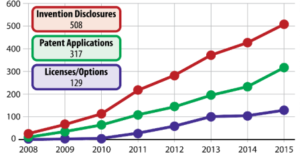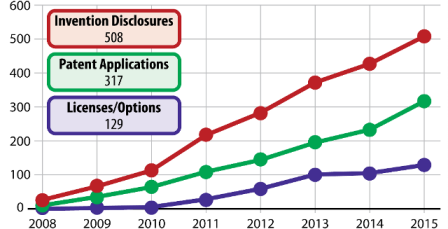FOR IMMEDIATE RELEASE
CONTACT:
Irina Silva (JBEI), [email protected], 510-486-4615
Tim Donohue (GLBRC), [email protected], 608-262-4663
Morgan McCorkle (BESC), [email protected], 865-574-7308
Three U.S. Department of Energy-funded research centers – the BioEnergy Science Center (Oak Ridge National Laboratory), the Great Lakes Bioenergy Research Center (University of Wisconsin–Madison and Michigan State University), and the Joint BioEnergy Institute (Lawrence Berkeley National Laboratory) – are making progress on a shared mission to develop technologies that will bring advanced biofuels to the marketplace, reporting today the disclosure of their 500th invention.
Created in 2007, the Bioenergy Research Centers (BRCs) work together to address the most significant challenges standing in the way of affordable, sustainable and scalable advanced liquid transportation fuels. In their focus on producing biofuels from cellulosic biomass (i.e., wood, grasses and the inedible parts of plants), the BRCs are developing a portfolio of new bio-based products, methods and tools for use in the biofuels industry.

Great Lakes Bioenergy Research Center Director Tim Donohue credits the BRCs’ continued success to its multidisciplinary research model, which brings together a diverse group of experts, including ecologists, economists, engineers, plant biologists, microbiologists, computational scientists and chemists.
“What we’re seeing,” Donohue says, “is that the collaboration at the heart of the BRCs research model really does increase the rate at which we conduct transformative research and develop new technologies. We would not have reached this milestone without the integration of our efforts and our expertise.”
Enabled by a broad range of genome-driven research methods, the BRCs’ technologies represent a variety of approaches to different bottlenecks in the current biofuel pipeline. Some technologies focus on improved ways of breaking down biomass for conversion into fuel, some on engineering plants with the characteristics most advantageous for biofuels, and still others on creating co-products that can help make advanced biofuels economically viable. That variety, however, does not represent a lack of focus.
BioEnergy Science Center Director Paul Gilna points to the 500 invention disclosures as proof of the BRCs’ progress, focusing on the role the BRCs are playing in creating a broad knowledgebase for future biofuels technologies.
“Over the past nine years, we’ve successfully harnessed a diversity of scientists and disciplines to collaboratively address the challenges of enabling the cellulosic biofuels enterprise on a scale far greater than any effort to date,” Gilna says. “It’s a privilege to be laying the scientific foundation for future work, and to be a leader in this ambitious effort.”
Joint BioEnergy Institute Chief Executive Officer Jay Keasling praised the pioneering efforts of the BRCs and their role in envisioning a future in which cellulosic biofuels provide transformative advantages for our nation.
“These inventions will be the new startups, the new fuels that will be in our tanks, the renewable materials in our lives, and the manufacturing jobs in America,” says Keasling.
BRC research is supported by the U.S. Department of Energy’s Office of Science. The Office of Science is the single largest supporter of basic research in the physical sciences in the United States, and is working to address some of the most pressing challenges of our time. For more information, please visit science.energy.gov.
More information about the BRCs:
BioEnergy Science Center (BESC), bioenergycenter.org
Headquartered at Oak Ridge National Laboratory in Oak Ridge, Tenn., BESC is a multi-institutional research organization performing basic and applied science dedicated to improving yields of biofuels by focusing on the fundamental understanding and elimination of biomass recalcitrance. This multidisciplinary research encompasses the biological, chemical, physical, and computational sciences, as well as mathematics and engineering.
Great Lakes Bioenergy Research Center (GLBRC), glbrc.org
Led by the University of Wisconsin–Madison with major partner Michigan State University, GLBRC is working to meet the nation’s need for a comprehensive suite of clean energy technologies, including next generation and drop-in fuels that can be used in today’s engines. Its research supports the development of a robust pipeline from biomass production through pretreatment and final conversion to fuel, with sustainability providing a unifying theme.
Joint BioEnergy Institute (JBEI), jbei.org
JBEI, based in Emeryville, Cal., is a multi-institutional research partnership led by Lawrence Berkeley National Laboratory (Berkeley Lab) dedicated to developing advanced drop-in biofuels—liquid fuels derived from the solar energy stored in plant biomass that can replace gasoline, diesel and jet fuels. Inside JBEI’s Emeryville laboratories, researchers use the latest tools in molecular biology, chemical engineering, computational and robotic technologies, and pioneering work in synthetic biology to transform biomass sugars into energy-rich fuels and chemicals.
